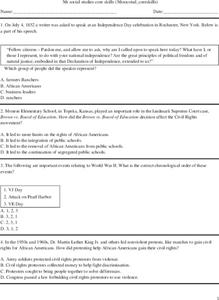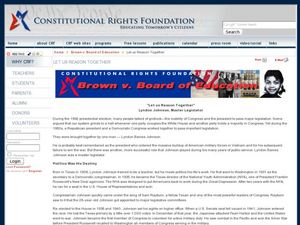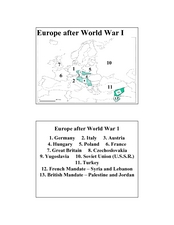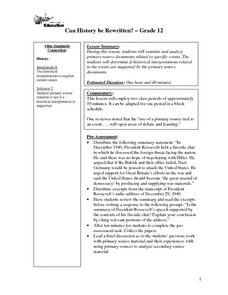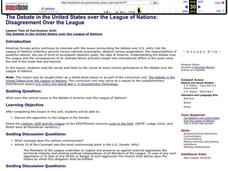Curated OER
The Emancipation Proclamation
Middle schoolers read one of the most important documents in our nation's history: The Emancipation Proclamation of 1863. After everyone reads the proclamation, they set out to write a "You Were There" type of report on it. They pretend...
Curated OER
Paths to Absolute Power
In this absolute power study guide worksheet, students read the notes provided regarding Cardinal Richelieu, Frederick the Great, and Peter the Great.
Curated OER
5th Grade Social Studies
In this social studies worksheet, 5th graders answer multiple choice questions about important court cases, World War II, Abraham Lincoln, and more. Students complete 14 questions.
Curated OER
Civic Oration Topic Planner "A Great Time in American History"
In this report planning worksheet, students prepare to write a 3-5 page report about one great time in American History. Students choose a topic, answer 4 questions to help in planning the report and take this form home for parental...
Curated OER
"Let us Reason Together" Lyndon Johnson, Master Legislator
Students explore the contributions of Lyndon B. Johnson. In this congress lesson plan, students listen to their instructor lecture on the prowess of Lyndon B. Johnson's legislative skills. Students respond to discussion questions...
Curated OER
Europe after World War I
In this Europe after World War I map worksheet, learners note the 11 regions of the Europe labeled on the map.
Curated OER
The Displacement of the Native Americans
Seventh graders comprehend the interaction and conflict between Native Americans and white settlers in the years following the Civil War. They examine how those conflicts impacted the Native American way of life on the Great Plains.
Curated OER
Mapping and Personifying Nations
Eleventh graders analyze the geography, actions, and relationships of countries involved in World War II. They create a map of Europe, Northern Africa, and the Pacific, and analyze and evaluate their self-made map of Europe and the...
Japan Society
Japan in the World Since 1945
What have US-Japanese relations been like since the conclusion of World War II? Why do some commentators identify Japan's postwar years as a subordinate independence? Invite your young historians to research Japan's status in the world...
Curated OER
Civil War Time Line
Students draw a time line on graph paper on a scale of one square to every five years beginning in 1770 and ending at 2000. They place historic events and inventions in their correct time period on the time line, and add their birthday...
Curated OER
Can History Be Rewritten?
Can history be rewritten? Or, more precisely, is history documented accurately? High school juniors and seniors compare primary source material with secondary sources. For example, they compare President Roosevelt's December 29, 1940...
Barren County Schools
American Revolution Project
Here you will find three simple and engaging American Revolution projects that will allow your learners to not only express their comprehension of major events and key terms during the war, but also offer the opportunity for great...
Curated OER
Why Do Governments Exist? Locke, Hobbes, Montesquieu, and Rousseau
Here is a great secondary source reading that includes the primary ideas and philosophies of the famed Enlightenment philosophers: Thomas Hobbes, John Locke, Charles Montesquieu, and Jean-Jacques Rousseau. In additional to discussing...
School District of Detroit
The Articles of the Confederation
Primary historical sources can be a challenge for some readers, so these seven guided-reading questions will be very useful to US History or Government classes studying The Articles of Confederation. Each question has multiple parts and...
Curated OER
Guidelines for Teaching the Holocaust
Eighth graders view a presentation about the importance of the Holocaust. In groups, they complete a workshop in which they discover the reasons and actions behind the event. They share their feelings about the material and stereotypes...
Curated OER
President William Taft
In this US history worksheet, students read a biography about President William Taft and answer ten true and false questions.
Curated OER
I, Spy
Fifth graders utilize the library in order to find the answers to three questions about The Revolutionary War. In this writing and library skills lesson, 5th graders pretend they are a Spy, and write the answers in a fictional letter to...
Curated OER
United Nations: What It Does for Us
Fifth graders will understand what the United Nations Organization does and will be able to identify the aims and purposes of the United Nations. They recognize the seven key areas of the Millennium Declaration.
Curated OER
Hit The Trail
Young historians research one of the most colorful periods in US History: the cattle drives of the 1800's. They research the three most popular trails, and complete mapping and writing assignments about each one. The lesson has many...
Curated OER
All Quiet on the Western Front
Students use unitedstreaming and Google Earth to investigate World War II and All Quiet on the Western Front. In this novel and technology lesson, students view a video about the novel using unitedstreaming video, visit the given...
Curated OER
Lincoln, the Great Emancipator?
Students examine the motivating factors that prompted Lincoln to draft the Emancipation Proclamation in 1863. They examine Lincoln's social and political beliefs, particularly as they pertained to slavery and race in the United States.
Curated OER
U.S. Entry Into WWI
Students identify the reasons why the United States entered World War I. In this world history instructional activity, students are given a lecture on Woodrow Wilson and analyze documents (specifically, Woodrow Wilson's speeches)....
Curated OER
Europe 1914
In this Europe 1914 map worksheet, learners note the 9 regions of the Europe labeled on the map and their relevance to World War II.
Curated OER
The Debate in the United States over the League of Nations: Disagreement Over the League
High schoolers examine the opposition of the US Senate to Woodrow Wilson's idea of a League of Nations. They discuss the central ideas involved in the debate over the League.




